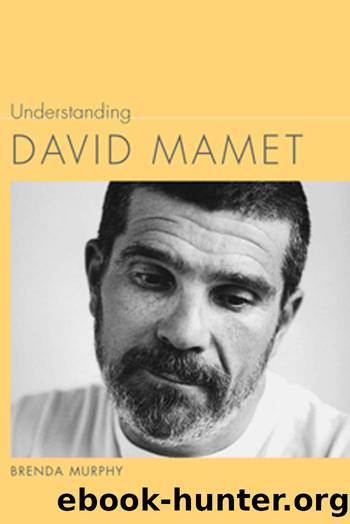Understanding David Mamet by Murphy Brenda;

Author:Murphy, Brenda;
Language: eng
Format: epub
Publisher: University of South Carolina Press
CHAPTER 7
Degeneration and Descent
Two of the plays Mamet lists among his tragedies, American Buffalo and Oleanna, portray a world of defeated possibility, where the hope of true human communication and empathy is destroyed by inevitable tragedy. Mamet has said that American Buffalo is âreally a tragedy about life in the family,â closely tied to the iconic American tragedy Death of a Salesman.1 Most simply it is a play about the corruption of love and friendship by the pursuit of money. Oleanna is about the failed ideal of community that forms the myth of U.S. academia, specifically the collaborative devotion to teaching and learning on the part of students and teachers as a part of a disinterested and pure pursuit of knowledge.
American Buffalo, 1977
The play that really launched Mametâs reputation in the theater was American Buffalo. In the mid-1970s, its air of gritty realism and its carefully crafted illusion of Chicago street argot had shock value for audiences and reviewers, who spoke of the young playwright as something truly new on the American theatrical landscape. It was this play that introduced the dialogue of âMametspeak,â which produces the illusion of ordinary speech through broken sentences, lines that do not respond directly to each other, stichomythic exchanges, the deft use of expletives, and the brilliant use of arresting vernacular expressions. Dialogue such as the following exchange between Don, the owner of a junk shop, and Teach, a small-time criminal, uses all these techniques to convey Donâs wounded pride at a perceived insult by a customer who had bought a buffalo nickel and Teachâs distracted response to him:
DON: And he tells me heâs the guy was in here yesterday and bought the buffalo off me and do I maybe have some other articles of interest.
TEACH: Yeah.
DON: And so I tell him, âNot offhand.â He says that could I get in touch with him, I get some in, so I say, âsure,â he leaves his card, Iâm sâposed to call him anything crops up.
TEACH: Uh-huh.
DON: He comes in here like Iâm his fucking doorman.
TEACH: Mmmm.
DON: He takes me off my coin and will I call him if I find another one.
TEACH: Yeah.
DON: Doing me this favor by just coming in my shop.
TEACH: Yeah.
Pause.
Some people never change.2
Mamet was disturbed by the many references to his dialogue as realistic street speech, and he made efforts to correct this impression in early interviews. He told Matthew Roudané, âAll realism means is that the language strikes a responsive chord. The language in my plays is not realistic but poetic. The words sometimes have a musical quality to them. Itâs language that is tailor-made for the stage. People donât always talk the way my characters do in real life, although they may use some of the same words.â3
In the background of American Buffalo was the Veblenian view of capitalism that also informs The Water Engine, Edmond, Glengarry Glen Ross, and Speed-the-Plow. Mamet said that, âas much as we might not like to think so, these people are us. And,
Download
This site does not store any files on its server. We only index and link to content provided by other sites. Please contact the content providers to delete copyright contents if any and email us, we'll remove relevant links or contents immediately.
The Power of Myth by Joseph Campbell & Bill Moyers(925)
Half Moon Bay by Jonathan Kellerman & Jesse Kellerman(911)
A Social History of the Media by Peter Burke & Peter Burke(880)
Inseparable by Emma Donoghue(844)
The Nets of Modernism: Henry James, Virginia Woolf, James Joyce, and Sigmund Freud by Maud Ellmann(739)
The Spike by Mark Humphries;(719)
A Theory of Narrative Drawing by Simon Grennan(706)
The Complete Correspondence 1928-1940 by Theodor W. Adorno & Walter Benjamin(704)
Ideology by Eagleton Terry;(659)
Bodies from the Library 3 by Tony Medawar(649)
Culture by Terry Eagleton(646)
World Philology by(645)
Farnsworth's Classical English Rhetoric by Ward Farnsworth(641)
A Reader’s Companion to J. D. Salinger’s The Catcher in the Rye by Peter Beidler(614)
Adam Smith by Jonathan Conlin(607)
High Albania by M. Edith Durham(592)
Game of Thrones and Philosophy by William Irwin(592)
Comic Genius: Portraits of Funny People by(581)
Monkey King by Wu Cheng'en(575)
